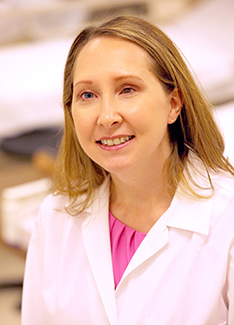 Melissa Owen, Assistant Clinical Professor, fell in love with working on the cardiac floor because of her patient’s positive outlook on life. After shifting her sights from ER nurse to the cardiac surgery unit, she worked as a heart transplant coordinator at Emory University Hospital, providing patients with pre- and post-transplant care for seven years. In the fall of 2013, she moved permanently to Emory School of Nursing, becoming Program Director for the Traditional BSN program in 2017.
Melissa Owen, Assistant Clinical Professor, fell in love with working on the cardiac floor because of her patient’s positive outlook on life. After shifting her sights from ER nurse to the cardiac surgery unit, she worked as a heart transplant coordinator at Emory University Hospital, providing patients with pre- and post-transplant care for seven years. In the fall of 2013, she moved permanently to Emory School of Nursing, becoming Program Director for the Traditional BSN program in 2017.
Her research focuses on palliative care in patients with heart failure and awaiting heart transplants. Palliative care is a holistic approach designed to be incorporated for patients with illnesses that affects their quality of life.
Owen earned her BSN degree from The College of New Jersey, MSN (Acute/Critical Care Clinical Nursing) from Emory University and finished her PhD in Nursing Science at Rush University. She also completed a graduate certificate in Palliative Care from the University of Colorado.
Briefly, tell us about a research project you’re working on…
My current study is a mixed-methods study exploring symptoms in heart transplant candidates. Participants complete the Edmonton Symptom Assessment Scale (ESAS) as well as a qualitative survey. The purpose of this study is to identify whether heart transplant candidates’ self-identified needs or stressors are congruent with what is reported by candidates on the ESAS.
Specific aims include:
- Describe commonly reported symptoms and stressors that may impact the quality of life of heart transplant candidates, as expressed by candidates in qualitative surveys and as reported on the ESAS.
- Compare the level of importance that heart transplant candidates attribute to symptoms identified by the ESAS versus the importance of those stressors and needs not captured by the ESAS.
- Identify symptom/stressor variation in relation to specific settings (inpatient versus outpatient), populations (with VAD versus without) awaiting transplant, and length of time on the transplant waiting.
This study involves two transplant centers, and I am the co-PI along with Dr. Kari Esbensen, a physician at Emory Healthcare.
What is one thing you hope your work can offer humanity by the end of your career?
By the end of my career, I hope that palliative care is routinely incorporated into the heart failure patients’ care and the equivalence of palliative care with hospice no longer exists. Perhaps a name change from palliative care to something like “supportive care” would help with this.
If you could go back in time and offer yourself some advice early in your career, what would you say?
Don’t play it safe and be afraid of rejection. Seek out and apply for opportunities. If you don’t ask or apply, the answer will definitely be no. But if you go for it, you might surprise yourself.
What do you enjoy most about being at Emory Nursing?
Emory Nursing is a special place. My colleagues are great – there is a lot of collaboration and support for projects. There is always someone else who is interested in at least a piece of what you are working on, which leads to great ideas. We also have fabulous students – I review a lot of undergraduate resumes and I am always so impressed with what our students have accomplished in just their short professional lives.
What professional accomplishment are you most proud of?
I have two actually – one cardiac research-related, and one education-related. I was just named as a Fellow in the Heart Failure Society of America (FHFSA) this month. In addition to my research, I also contributed to this organization by serving on the nursing committee and by serving as the nursing co-chair for the Future Leaders in Heart Failure event. In teaching, I have received the “Heart of the Students” Award twice. This award is bestowed upon a faculty and staff member by the graduating class in recognition of outstanding support during their nursing school experience. This award means a lot to me because one of my main goals is to prepare the next generation of nurses.
Social Media Handles
- Twitter: @DrMelissaOwen
- LinkedIn: Melissa Owen
